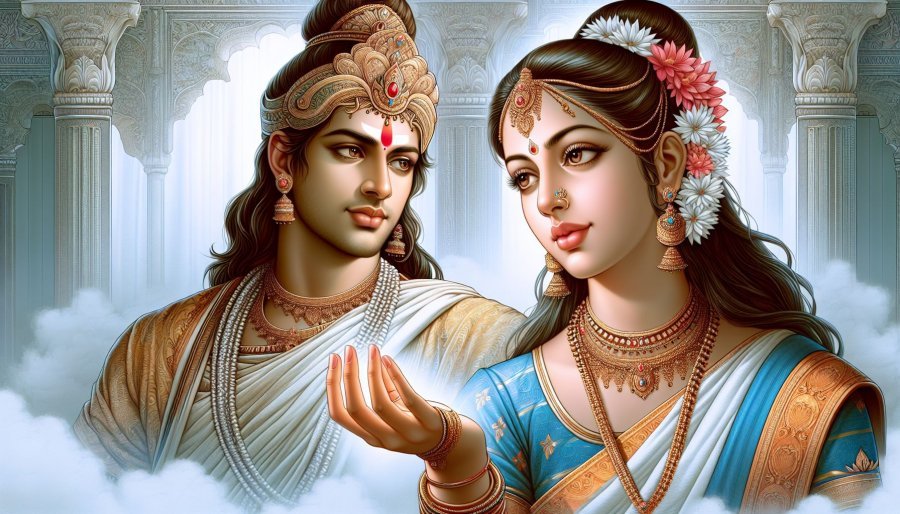Section LV [summary]
Book index: Mahabharata (English)
This page contains a summary of the Mahabharata Section LV including examples of moral lessons in daily life. The Maha-Bharata is one of the largest epics ever written containing roughly 100,000 Sanskrit verses. It deals with the legendary history of ancient India and contains a large number of interwoven tales.

Short summary of the chapter:
Nala, the king of the Nishadhas, was asked by the gods, including Indra and Yama, to be their messenger to Damayanti for a Swayamvara. Nala, who was also in love with Damayanti, hesitated to fulfill the gods' request, but eventually agreed to deliver their message. With the assurance of the gods that he would be able to enter the well-guarded palace, Nala approached Damayanti and was mesmerized by her beauty. Damayanti, equally captivated by Nala's presence, questioned him about his identity and the reason for his visit, to which Nala revealed that he was a messenger of the gods who wanted her to choose one of them as her husband.
Despite the love and admiration growing between Nala and Damayanti, he urged her to choose one of the gods as her husband as per their request. Damayanti was left in a dilemma as she found herself torn between her growing feelings for Nala and the gods' desires. Nala, caught between his duty as a messenger and his love for Damayanti, maintained his composure and waited for her decision. The story beautifully portrays the complexity of human emotions and the conflicts that arise when duty, love, and divine will intersect, leaving both Nala and Damayanti in a state of uncertainty and emotional turmoil.
As Damayanti contemplated her decision, Nala's emotions continued to intensify, and he struggled to suppress his love for her while fulfilling his duty. Despite the internal conflict, Nala remained steadfast in his commitment to the gods and awaited Damayanti's choice with bated breath. The tale illustrates the timeless theme of sacrifice and selflessness as Nala and Damayanti navigate the complexities of duty, love, and divine intervention, setting the stage for a compelling narrative filled with drama and emotional depth.
Full English translation:
This page is merely a summary which is automatically generated. If you are looking for authentic sources such as the Sanskrit text or the Full English translation of Mahabharata Section LV, have a look at the following articles:
Section LV, online text
English translation by Kisari Mohan Ganguli.
Read this and other chapters online.
Mahabharata (English Summary)
by Kisari Mohan Ganguli | ISBN-10: 8121505933
Buy the latest edition:
FAQ of Section LV:
Who were the immortals that approached Nala for Damayanti's sake?
The immortals were Indra, Agni, Varuna, and Yama who desired to marry Damayanti.
Why did Nala hesitate to fulfill the gods' request as their messenger?
Nala hesitated because he was under the influence of love himself.
How did Nala manage to enter Damayanti's well-guarded palace unnoticed?
Nala was able to enter due to the celestial powers of the gods.
Mahabharata Section LV in daily life:
In the narrative, Nala finds himself in a challenging situation wherein despite his own feelings, he must fulfill a promise made to the celestials— to convey their message to Damayanti. This story underscores the importance of fulfilling commitments, even when personally challenging, highlighting integrity and the strength to honor one’s word. Nala's predicament also teaches us about the struggle between personal desires and duty, showcasing the value of placing integrity and commitments above personal interests.
Implementing the essence of this story in daily life involves acknowledging and standing by the promises we make, no matter how difficult the circumstances might get. It suggests that when faced with choices that pit our desires against our duties, prioritizing our commitments can lead to respect and trustworthiness. The narrative encourages us to navigate our feelings responsibly, ensuring we don't let personal desires cloud our judgment or commitments. By emulating Nala's example, we learn to approach our duties with honor and respect for others, ultimately enhancing our relationships and personal character.
